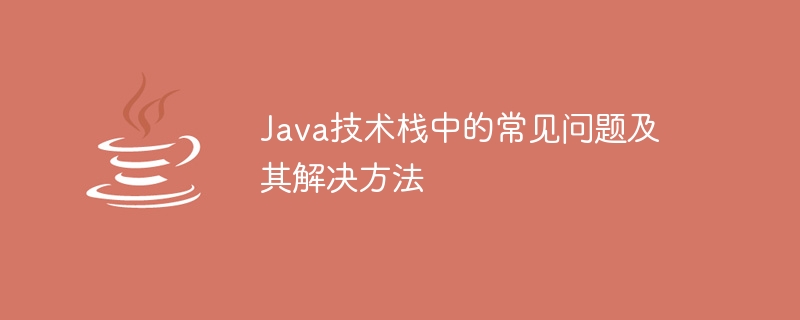

Common problems in the Java technology stack and their solutions
When developing Java applications, we often encounter some problems, such as performance issues and memory leaks , thread safety, etc. This article will introduce some common problems and their solutions, and give corresponding code examples.
1. Performance issues
1.1 Performance issues caused by frequent object creation
Frequent creation of objects will lead to frequent triggering of garbage collection, thus affecting the performance of the program. The solution is to use object pooling or caching to reuse objects.
Sample code:
// 使用对象池重用对象 ObjectPool<MyObject> objectPool = new ObjectPool<>(() -> new MyObject()); // 从对象池中获取对象 MyObject myObject = objectPool.getObject(); // 使用完后放回对象池 objectPool.releaseObject(myObject);
1.2 Performance issues in loops
If there are a large number of calculations or IO operations in the loop, it will affect the performance of the program. The solution is to use parallel streams or use multi-threading for task splitting and concurrent execution.
Sample code:
// 使用并行流进行计算
int result = IntStream.range(1, 1000).parallel().sum();
// 使用多线程进行任务拆分和并发执行
ExecutorService executorService = Executors.newFixedThreadPool(4);
List<Future<Integer>> futures = new ArrayList<>();
for (int i = 1; i <= 1000; i++) {
int finalI = i;
futures.add(executorService.submit(() -> calculate(finalI)));
}
int result = 0;
for (Future<Integer> future : futures) {
result += future.get();
}
executorService.shutdown();
// 计算方法
private static int calculate(int i) {
// ...
return result;
}2. Memory leak problem
2.1 Memory leak caused by the object not being garbage collected
In Java, if the object does not is referenced and will be collected by the garbage collector. However, in some cases, the object may still be referenced and cannot be recycled, resulting in a memory leak. The solution is to pay attention to the release of object references and avoid holding objects for a long time.
Sample code:
// 较长生命周期的对象被引用导致内存泄漏
public class MyEventListener implements EventListener {
private List<Event> events = new ArrayList<>();
public void addEvent(Event event) {
events.add(event);
}
public void removeEvent(Event event) {
events.remove(event);
}
// ...
}
// 修改为弱引用,可以被垃圾回收
public class MyEventListener implements EventListener {
private List<WeakReference<Event>> events = new ArrayList<>();
public void addEvent(Event event) {
events.add(new WeakReference<>(event));
}
public void removeEvent(Event event) {
Iterator<WeakReference<Event>> iterator = events.iterator();
while (iterator.hasNext()) {
WeakReference<Event> weakRef = iterator.next();
Event ref = weakRef.get();
if (ref == null || ref == event) {
iterator.remove();
break;
}
}
}
// ...
}2.2 Memory leaks caused by static collections
Object references in static collections will not be released with the end of the program, which can easily lead to memory leaks. The solution is to use a weak reference collection such as WeakHashMap.
Sample code:
// 静态集合导致的内存泄漏
public class MyCache {
private static Map<String, Object> cache = new HashMap<>();
public static void put(String key, Object value) {
cache.put(key, value);
}
public static Object get(String key) {
return cache.get(key);
}
// ...
}
// 使用WeakHashMap避免内存泄漏
public class MyCache {
private static Map<String, WeakReference<Object>> cache = new WeakHashMap<>();
public static void put(String key, Object value) {
cache.put(key, new WeakReference<>(value));
}
public static Object get(String key) {
WeakReference<Object> weakRef = cache.get(key);
return weakRef != null ? weakRef.get() : null;
}
// ...
}3. Thread safety issues
3.1 Data inconsistency caused by thread safety issues
In a multi-threaded environment, if multiple If threads modify shared data at the same time, data inconsistency will occur. The solution is to use synchronization mechanisms to ensure data consistency, such as using synchronized or using concurrent containers.
Sample code:
// 使用synchronized保证线程安全
public class Counter {
private int count;
public synchronized void increase() {
count++;
}
public synchronized int getCount() {
return count;
}
}
// 使用并发容器保证线程安全
public class Counter {
private AtomicInteger count = new AtomicInteger();
public void increase() {
count.incrementAndGet();
}
public int getCount() {
return count.get();
}
}3.2 Deadlock problem
Deadlock means that when multiple threads compete for resources, they form a state of waiting for each other, causing the program to be unable to continue execution. The solution is to avoid cyclic waiting, apply for resources in an orderly manner, avoid holding locks while waiting for other locks, etc.
Sample code:
// 避免循环等待
public void transfer(Account from, Account to, int amount) {
Account firstLock = from.getBalance() < to.getBalance() ? from : to;
Account secondLock = from.getBalance() < to.getBalance() ? to : from;
synchronized (firstLock) {
synchronized (secondLock) {
// 转账操作
}
}
}This article introduces some common problems and their solutions in the Java technology stack, and gives corresponding code examples. I hope it can help readers better solve the problems encountered in Java development and improve the performance and stability of the program.
The above is the detailed content of Common problems in the Java technology stack and their solutions. For more information, please follow other related articles on the PHP Chinese website!




